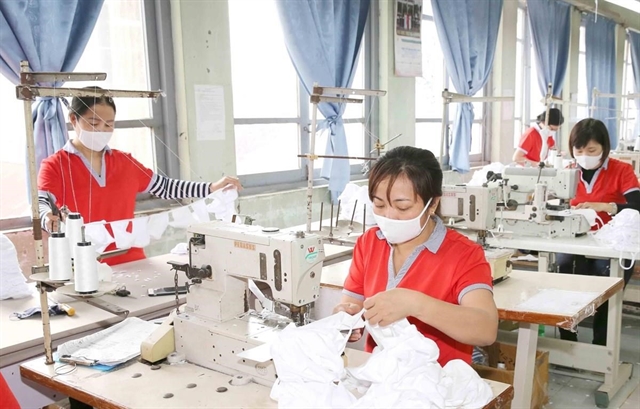The COVID-19 pandemic took its toll on both the society and the economy during the social distancing period, with millions of family businesses and thousands of companies having to temporarily stop operations. As time went by, more and more jobs disappeared.
Labour market suffers the COVID-19 brunt
According to a survey by the General Statistics Office of Vietnam on affected enterprises and reports from localities on the problems facing their workforce, as of mid-April, there were 5 million workers impacted by the pandemic. About 84.8 percent of questioned firms said they were experiencing difficulties due to COVID-19.
As of mid-April, there were 5 million workers impacted by the pandemic. About 84.8 percent of questioned firms said they were experiencing difficulties due to COVID-19.
The International Labour Organization (ILO) in Vietnam said the influence of the pandemic on the labour market might become clearer in the second quarter.
Representatives of exporters in the garment-textile and leather-footwear sectors said their biggest US and EU clients had requested rescheduling delivery deadlines, stopped signing new contracts, and even cancelled existing contracts. New contracts for June and following months are yet to be negotiated and the chance of contract recovery by year’s end remains low.

The electronics industry has also borne the brunt of the disease, with Samsung’s global and production forecast set to drop. Samsung Vietnam, meanwhile, planned to cut its export target to about 45.5 billion USD in 2020 compared to 51.38 billion USD in 2019.
ILO experts predicted that by the end of the second quarter, the crisis might negatively impact the livelihoods of between 4.6 and 10.3 million Vietnamese citizens. They will face the risk of getting their working hours and salaries cut or losing their jobs.
Switching to online recruitment
Currently, the maintaining of employment is a priority. The labour market has not been ‘frozen’ but switching to online recruitment to adapt to the new context.
Vietnam has shown its capable of controlling the disease and begun easing social distancing measures, hence positive developments in demand for recruitment.
On April 24, to support job seekers amid the pandemic, the project “200,000 job opportunities to assist workers and enterprises in overcoming COVID-19” was launched on four popular recruiting-service websites, namely timviecnhanh.com; vieclam24h.vn; viectotnhat.com; and mywork.com.vn. After less than a week, it attracted registration from 4,000 companies and curriculum vitae from over 1,500 workers.
Duong Thi Tuyet Trinh, who oversees the recruitment section of the project, said: “From the four websites, we calculated that over 10,000 firms have demand for more than 300,000 workers to fill 30,000 positions.”
Meanwhile, Navigos Search, which offers recruiting service targeting professionals, is implementing a “Career Support” campaign to connect job seekers to their most suitable recruiters. In the first week of the pilot run, the campaign received registration from over 1,200 employees across Vietnam.

Nguyen Phuong Mai, CEO of Navigos Search, said: “Vietnam has shown its capable of controlling the disease and begun easing social distancing measures, hence positive developments in demand for recruitment. A number of firms have stepped hiring new employees to quickly recover their production and business.”
Solving the puzzle of the “double crises”
Vietnam is among leading countries globally in terms of public health. It is time for the nation to show its similar excellency in tackling socio-economic and workforce challenges, said ILO Vietnam Director Chang-Hee Lee.
He praised the country’s introduction of economic stimulus and enterprise support packages.
Lee said: “I would like to emphasise that the Government direct its support and subsidy package to enterprises which make best efforts to retain workers and to minimise layoffs, by making adjustment to working hours, job sharing, on-the-job training, wage cuts which are consulted with trade unions and workers. It can encourage enterprises to make the best efforts to retain workers or minimise layoffs. Then, it can slow down the process of layoffs, minimising the societal shock it can trigger, while preserving workers’ productive capacity for a quicker post-COVID 19 recovery.”
COVID-19 is a global crisis. Even when Vietnam could be capable of controlling the disease, it would still be affected as its trade partners might still be struggling with the pandemic.
Vietnam is among the leading countries globally in terms of public health. It is time for the nation to show its similar excellency in tackling socio-economic and workforce challenges.
Lee noted: “It is important to minimise the impacts of various containment measures on micro-enterprises, family business and rural agricultural communities. These are the businesses that sustained Vietnam during the wars and economic crises in the past. However, the current pandemic and social distancing measures are causing a heavy strain on their capacity to absorb economic and social shocks. When there is an abrupt collapse of global demand for Vietnamese goods and services, or a disruption of global supply chains, millions of micro-enterprises, family businesses and rural farming communities provide subsistence support. Therefore, it is urgent to allow them to play their roles at this critical juncture, with the Government’s support.”
Mai said that COVID-19 has interrupted the global supply chain, making firms aware of the necessity of supply sources and production diversification and of not relying on a country. Such facts have given a boost to a wave of shifting investment and production facilities to Southeast Asian countries, including Vietnam as the most attractive destination.
The COVID-19 combat is not only a health challenge. Measures introduced to protect the public health must also need to ensure livelihoods of residents. If people’s livelihoods are not guaranteed, governments will fail in protecting them in the fight against the pandemic.

There is a need to protect people’s livelihoods (Photo: VNA)
